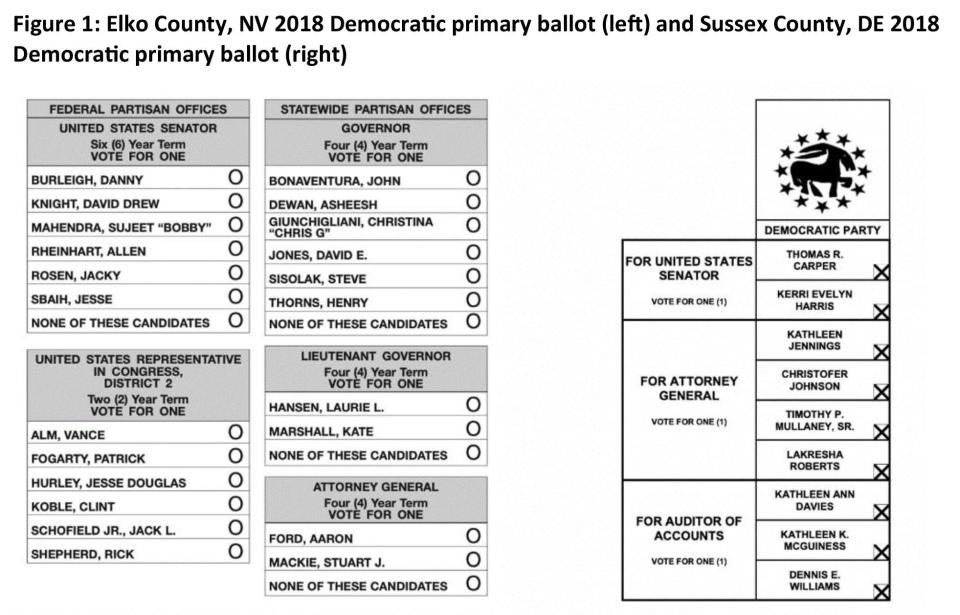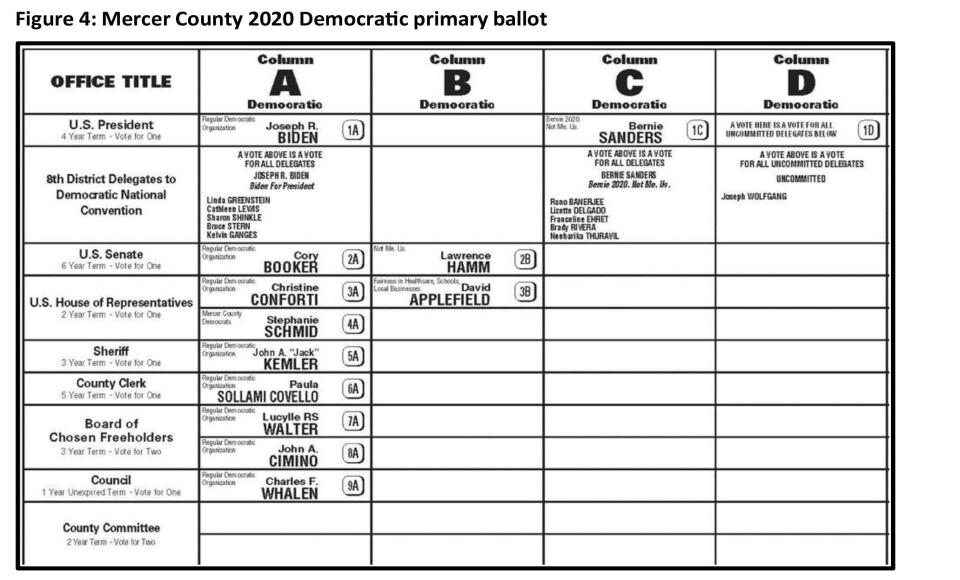It's over. New Jersey's county line is gone for good. Will our politics change? | Stile
- Oops!Something went wrong.Please try again later.
Throughout their desperate last attempt to save New Jersey’s wobbling, boss-driven county machinery, Democratic Party lawyers relied on scare tactics.
Changing the design of primary ballots this late in the election cycle, they argued in federal court, would only create “chaos” and confuse voters — the implication being that New Jersey voters would be too stupid to adapt to a change in format.
Changing the format simply can’t be done, they said — even though a vendor hired to print and format ballots for county clerks testified that yes, it could be done in time for the June 4 primary.
And — my favorite — discarding the old-school “county line” format that has protected the chosen candidates and punished outsiders, they argued, was tantamount to a “radical” change.
In one brief submitted by the Camden County Democratic Committee — the central office of power broker George Norcross’ political fief — “radical” was cited as a warning five times.
The repeated use of the word echoed like the hour-by-hour Fox News drumbeat attack of the “radical Biden agenda.” Write or say it enough and readers and listeners subconsciously accept it as true.

Even Neal Katyal, the high-priced and high-powered former Obama solicitor general — whom Politico described as “the Beltway-famous legal combatant against Trump-era assaults on democratic norms” — claimed that the change Rep. Andy Kim sought in his lawsuit to upend the line represented a “radical departure from New Jersey’s settled elections practices." Katyal expressed that view in a brief written on behalf of the Middlesex County Democratic Committee.
But the three judges presiding over the case in the U.S. Court of Appeals for the 3rd Circuit in Philadelphia didn’t scare easily.
They dismissed the sky-is-falling talk of voter chaos as “speculation.” And they scoffed at the suggestion that discarding the old ballot bracketing county-blessed candidates in a column, or line, represented “radical change."
After all, how can it be “radical” when the "office block balloting" format Kim and his allies sought — a design in which candidates on the ballot seeking the same office are grouped together — is the norm in the rest of the country and already used in two New Jersey counties?
Injunction to destroy New Jersey's county line is upheld
In a historic, 35-page ruling, the appellate panel upheld a federal District Court injunction, issued in late March, that orders the office block ballot to be used in the Democratic contests for the June 4 primary. (The ruling doesn’t apply to the Republican contest, which will continue using the traditional line format.)
In some ways, it comes as no surprise — Democratic county clerks quickly abandoned their challenge to the lower court ruling and have been busy drafting new block ballot designs, as the court noted.
Yet, to have that ruling endorsed by the appellate judges — who found that the old system will likely be deemed unconstitutional — proved to be a red-letter date in New Jersey political history.
It may not rank with, say, the enactment of the modern New Jersey Constitution in 1947 or even the one-person, one-vote redesign of legislative districts in the late 1960s, but it is a pivotal moment that will weaken boss rule, or force it to adapt to a new, more democratic reality.
This was no “fly-speck issue," as an angry Gov. Phil Murphy called it in a recent interview.
“The 3rd Circuit's precedential, unanimous, swift decision affirming the District Court's preliminary injunction is monumental," said Yael Bromberg, Brett Pugach and Flavio Komuves, the attorneys who represented Kim in his lawsuit that upended the system — and the U.S. Senate race.
“It ensures fair ballots in the applicable upcoming primary elections, and makes clear that New Jersey's anti-democratic practice of the county line places an unconstitutional 'governmental thumb on the scale' and will not be tolerated by the courts," Kim's attorneys said in a statement.
For years, the county line on the ballot was the crucial cog in party machine power. County leaders and bosses who had an iron grip on their committees endorsed candidates and bracketed them together on the line.
Those who didn’t get the endorsements — or chose to run without them — were often doomed to an obscure location on the ballot commonly known as "Ballot Siberia." And Siberian candidates were doomed to lose.
Candidates fortunate to win a spot on the line almost always won. It was an insurmountable advantage — but it didn’t give much room for competition. Or democracy.

The issue had been bubbling on the back burner in recent years but gained traction in the fall when first lady Tammy Murphy entered the Democratic primary for Senate with meager political experience and a background as a Republican donor and voter.
She saw an opportunity after the Sept. 21 indictment of Sen. Bob Menendez on bribery charges. Menendez, who faces trial next month, will not seek reelection — although he has raised the possibility of running as an independent if exonerated.
Murphy quickly won the blessings of the most populous North Jersey counties, which made her pursuit of the Democratic nomination seem like a cakewalk. But instead, she walked right into a firestorm.
Kim, who leaped into the race the day after Menendez’s indictment, found himself as the long-shot underdog — despite his years of working as a national security adviser for former President Barack Obama, despite his flipping a Republican competitive district in 2018 and despite his national profile as the congressman caught on camera cleaning up the U.S. Capitol rotunda after the Jan. 6, 2021 riot.
Murphy had the line. Kim didn’t have a chance.

He filed his lawsuit in February and began to harness some of the grassroots anger over the process and over the coattail nepotism that was supposed to sweep Murphy into office. He racked up victories in county conventions where a secret ballot was held. Polling looked grim for Murphy — suggesting that she might have lost even with the institutional advantages at her disposal.
She dropped out last month. Kim, who had the clubhouse door slammed in his face, is now the front-runner.
Charlie Stile: NJ's ballot line system is dead — the 'magnitude' will reverberate across politics
Decision destroys line: 3rd Circuit upholds federal order that ends the county line on New Jersey ballots
What comes next for Jersey politics?

And now, at least for the moment, the system that operated with efficiency for the chosen and indifference to the outsiders, has been upended.
Democratic voters will face a new ballot design much as they dealt with mail-in ballots for the first time during the pandemic in 2020. That was a far more complicated process, and yet voters got used to it and now it’s a popular method. Block ballot design looks like an easier lift.
The ruling isn’t necessarily the death knell for the party boss system. Political bosses and veterans have an uncanny way of adapting and circumventing other reforms, like pay-to-play restrictions on campaign financing. And the Legislature, which is packed with officials whose careers are indebted to the boss system, is planning to review changes in the system and ballot design.
They could, for example, call for a coded block ballot where their endorsed preferences are listed with a special marker — a star next to their name or a color designation — that will signal to voters that this is the candidate who has the certified seal of county boss approval.
But until then, there is another future on the horizon, one in which candidates for office don’t have to kiss the ring of county bosses. It’s one where incumbents have more freedom to cast buck-the-bosses votes in the Legislature or in town halls, since they no longer have to fear losing a place on the line come reelection time. They will now be grouped in a block on the ballot.
And in the context of New Jersey political history, that is indeed, “radical” change.
Charlie Stile is a veteran New Jersey political columnist. For unlimited access to his unique insights into New Jersey’s political power structure and his powerful watchdog work, please subscribe or activate your digital account today.
Email: stile@northjersey.com
This article originally appeared on NorthJersey.com: NJ county line is gone. Will our voting and politics change?

